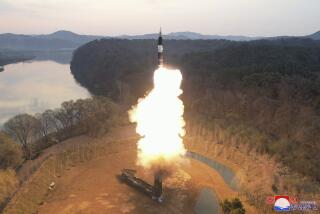South Korea’s leader warns North after latest missile launch

North Korea launches several suspected anti-ship missiles amid protest of the South’s support of fresh U.N. sanctions on the North.
North Korea’s latest launches of several suspected anti-ship missiles were short-range and landed well short of past efforts, but they still served as a defiant message for its enemies that Pyongyang will continue to pursue a weapons program that has rattled its neighbors and Washington.
The projectiles were fired Thursday from the North Korean eastern coastal town of Wonsan and likely flew about 125 miles, South Korea’s Joint Chiefs of Staff said. They landed in waters between the Korean peninsula and Japan, where the U.S. aircraft carriers Carl Vinson and Ronald Reagan participated in joint exercises with the South Korean navy that ended earlier this week.
South Korean President Moon Jae-in, a liberal who has expressed a desire to reach out to Pyongyang, said during a National Security Council meeting that he “won’t back off even a single step and make any compromise” on the issue of national security. He warned that North Korea could only face further international isolation and more economic difficulties.
The North’s missile tests present a difficult challenge to Moon. North Korea, which could have a working nuclear-tipped intercontinental ballistic missile in the next several years, may also be the most urgent foreign policy concern for the Trump administration, which has been distracted by domestic political turmoil and has insisted China do more to rein in the North’s weapons activities.
South Korean military spokesman Roh Jae-cheon said the launch was in response to the joint drills and intended to show off Pyongyang’s widening arrange of missiles and its “precision strike capabilities” on ships.
North Korea’s weapons tests are meant to build a nuclear and missile program that can stand up to what it sees as U.S. and South Korean hostility, but they are also considered by outside analysts as ways to make its political demands clear to leaders in Washington and Seoul. Analysts say the latest test appeared to be aimed at keeping up pressures on Moon to wrest concessions.
Moon has sought to expand cross-border civilian exchanges as a way to improve ties, but North Korea on Monday rejected a Seoul civic group’s offer to provide anti-malaria supplies. The rejection was meant to protest South Korea’s support of fresh U.N. sanctions on the North, adopted last week.
In what will likely become another source of animosities, Moon’s government said Thursday that it will let two of the four North Korean fishermen recently rescued at sea resettle in the South in accordance with their wishes. The two other fishermen, who want to return home, will be repatriated.
Pyongyang is expected to demand the return of all four fishermen by accusing Seoul of enticing them to defect to the South.
The launches Thursday were North Korea’s fourth missile test since Moon’s inauguration on May 10.
Analyst Kim Dong-yub at Seoul’s Institute for Far Eastern Studies said the projectiles, which showed longer range than North Korea’s previously known KN-01 anti-ship cruise missiles, were likely from a new cruise missile system the North displayed during a massive April 15 military parade. The improved range indicates that North Korea is pursuing weapons capable of reaching U.S. aircraft carriers that operate from deeper positions, he said.
Last month, North Korea premiered a powerful new mid-range missile that outside experts said flew higher than any other missile previously tested by Pyongyang.
The North in following weeks launched a solid-fuel mid-range missile that can be fired on shorter notice than liquid-fuel missiles, as well as what it described as a new “precision-guided” missile, which experts say is designed with a maneuverable terminal stage meant to frustrate missile defense systems such as the U.S. Terminal High Altitude Area Defense that is being deployed in South Korea.
ALSO
Myanmar military, fishermen find bodies in search for plane
More to Read
Sign up for Essential California
The most important California stories and recommendations in your inbox every morning.
You may occasionally receive promotional content from the Los Angeles Times.










